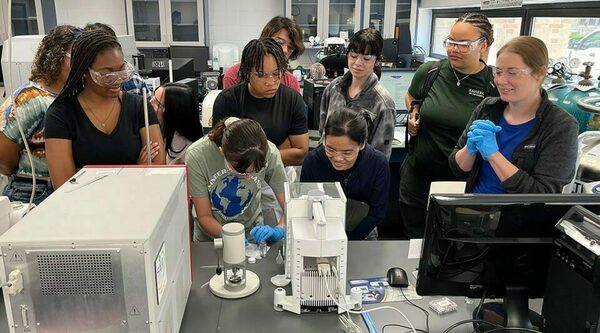
Anna Matzner in the Materials Characterization Facility at Notre Dame (mcf.nd.edu).
Sustainable energy, clean water, affordable healthcare solutions — these were some of the issues that student-researchers from colleges and universities around the country addressed at Notre Dame this summer.
The students were participants in SMASH Engineering, Soft Materials for Applications in Sustainability and Healthcare, a new Research Experiences for Undergraduates (REU) program at Notre Dame sponsored by the National Science Foundation (NSF).
The program, which gave 12 undergraduates hands-on, full-time research experiences with 12 Notre Dame faculty mentors, was organized by the Department of Chemical and Biomolecular Engineering in partnership with the Materials Science and Engineering program.
Working side-by-side with Notre Dame faculty and graduate student mentors, undergraduates advanced research in the development of filters for purifying water and air; biomaterials for better diabetes treatments; 3D tissue cultures and hydrogels for drug testing; and safer batteries.
“Soft materials are squishy things, polymers, gels, and plastics,” said William Phillip, Rooney Family Collegiate Chair of Engineering and program principal investigator. “They play important roles in established and emerging technologies, yet they are not covered in detail in many science and engineering classrooms at the college-level.”
“Engineering of advanced soft materials is critical for increased energy efficiency and clean energy technologies for a sustainable future,” said Jennifer Schaefer, Sheehan Family Collegiate Associate Professor and program co-principal investigator.
SMASH brought together students with a wide-array of majors: chemical, electrical, mechanical, biomedical engineering, materials science and chemistry. The program supplements research experiences with career discernment presentations by industry experts and research-themed workshops and demonstrations.
“The students were amazing. Some of them had not had the opportunity to do research before,” said Victoria Goodrich, teaching professor in chemical and biomolecular engineering. “Others were exploring facilities and equipment they’d never seen at their home institutions.”
“All of the students acquired technical proficiency, but more importantly they gained confidence in their ability as researchers.”
The nine-week program culminated at Notre Dame with a presentation at the 2023 Summer Undergraduate Research Symposium. The 3-year REU will be offered for the next two summers at Notre Dame.